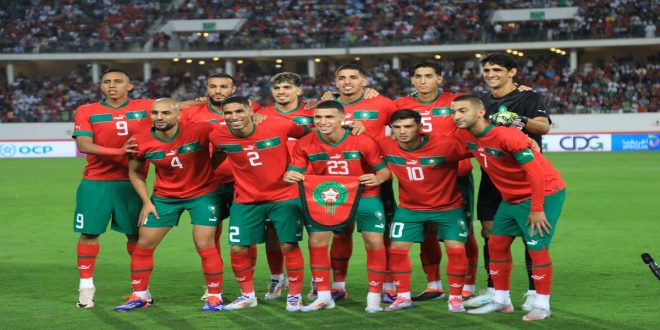Morocco’s rise as a global football power spotlighted by The New York Times

Morocco’s transformation into an “emerging superpower” in global football has been the focus of a detailed report by The New York Times.
The American publication highlights the North African nation’s substantial progress in sports infrastructure, talent development, and football performance, underscored by its historic achievements and ambitious future plans.
In a feature titled “How Morocco is Emerging as a Booming Football Superpower,” The New York Times credits Morocco’s advancements to deliberate investments and strategic planning.
The country, now a central hub for African football, has further solidified its position with the establishment of FIFA’s Africa Office in Marrakech.
This development was formalized through an agreement signed by Moroccan Prime Minister Aziz Akhannouch, FIFA President Gianni Infantino, and Fouzi Lekjaa, President of the Royal Moroccan Football Federation (FRMF).
The report lauds Morocco’s historic feat during the 2022 FIFA World Cup, where it became the first African and Arab nation to reach the semi-finals.
The publication describes the achievement as a milestone that resonated far beyond the continent, elevating Morocco’s profile in the global football community.
Morocco is set to co-host the 2030 FIFA World Cup with Spain and Portugal, further showcasing its readiness for the sport’s grandest stage.
Central to this preparation is the Mohammed VI Football Academy, located near Rabat.
The “ultramodern” facility, spanning 2.5 square kilometers, features a school, medical center, and training fields, representing a cornerstone of Morocco’s football development strategy.
The academy is complemented by five regional training centers built across the country in 2017.
The nation’s football ambitions are reflected in the construction of the Hassan II Stadium, a 115,000-seat venue set to become the largest football stadium in the world.
Slated for completion ahead of the 2030 World Cup, the stadium symbolizes Morocco’s emergence as a global football powerhouse, with hopes of hosting the tournament’s final.
Beyond infrastructure, Morocco has taken significant strides in fostering young talent.
Initiatives like the National Football Training Fund, launched by the FRMF, the OCP Group, and private partners, aim to professionalize training centers and nurture future stars.
The success of Moroccan clubs on the continental stage further underscores the nation’s footballing renaissance.
Wydad Casablanca and Raja Casablanca have claimed multiple CAF titles in recent years, solidifying Morocco’s dominance in African competitions.
Adding to its growing football portfolio, Morocco is set to host the next five editions of the Under-17 Women’s World Cup starting in 2025 and the World Football Summit in Rabat this April, a gathering of global football leaders and experts.
With improved talent detection systems, advanced facilities, and a clear vision, Morocco has firmly positioned itself as a beacon of football excellence, ready to leave a lasting mark on the global stage.




